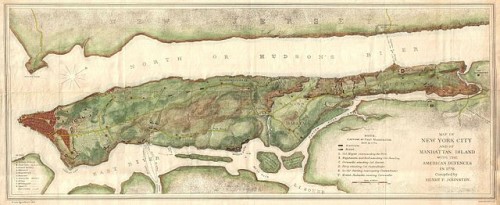While on a train to New York, I overheard the following from a young man speaking Nuyorican English (i.e. the Latino-American New York dialect): “I’m on a train in Jersey to visit my cousin in Manhattan.” This would be an unnoteworthy sentence except for the last word, for which he markedly elided several consonants: mæ̃.æʔn (“Ma’a’uhn”).
This ia a strange sequence of sounds for English, but given “Manhattan’s” tricky juxtaposition of /n/ and /h/, it’s a common type of variant*. It occurred to me, however, that I’ve never found any consensus on the “local” pronunciation of this word, or even if there is anything like a local pronunciation. (And given similar discussions of this type, I doubt there’s just one!)
If there is anything I have noticed that New Yorkers tend to do more than others, it is to reduce the word’s first syllable; hence where my middle-American-bred parents would speak of “man-hattin” (mænhætn̩), New Yorkers will sometimes truncate this entirely, so it’s more or less “mnn-hattin” (mn̩hætn̩).
New Yorkers don’t always knock off that first /a/, though. So there is also the question of where “-anh” falls in terms of New York’s tense-lax split (that is, /a/ before /n/ can be pronounced in two slightly different ways depending on several factors). My impression is that when New Yorkers do not reduce the first syllable, it falls into the lax category, so that it contrasts slightly with the raised/nasal General American pronunciation–mænhætn̩ vs. meənhætn̩. But I admit that I’ve heard this so seldomly in my lifetime that my memory might be faulty.
And as the opening anecdote suggests, there are probably all kinds of other quirky pronunciations that occur in rapid or informal speech. I would not be at all surprised to hear a dropped /n/, /h/ or /t/, not to mention combinations of such elisions.
This is yet another example of how variable local pronunciations of place names can be. This one, I suspect, may exhibit a particularly large number of variants because of the inexactitude (and hence infrequence) of “Manhattan” as a place marker for New Yorkers. You’re more likely to hear someone say, “I live in the East Village” than “I live in Manhattan,” just as a Brooklynite is more likely to say she is “going into the city” than identifying the borough of her destination.
*Although more common if a morpheme or word boundary separates them, as in “unhappy” or “in hot water.”

